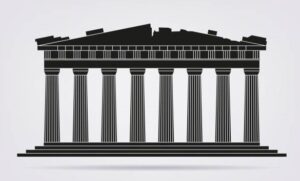Acropolis:
The Acropolis hill (acro – edge, polis – city), so-called the “Sacred Rock” of Athens, is the most important site of the city and constitutes one of the most recognizable monuments of the world. It is the most significant reference point of ancient Greek culture, as well as the symbol of the city of Athens itself as it represents the apogee of artistic development in the 5th century BCE. During Perikles’ Golden Age, ancient Greek civilization was represented in an ideal way on the hill and some of the architectural masterpieces of the period were erected on its ground.
Propylaea:
The Propylaea is the monumental entrances to the sacred area dedicated to Athena, the patron goddess of the city. Built by the architect Mnesicles with Pentelic marble, their design was avant-garde. To the south-west of the Propylaea, on a rampart protecting the main entrance to the Acropolis, is the Ionian temple of Apteros Nike or Wingless Victory.
Parthenon:

The Parthenon. It is the most important and characteristic monument of the ancient Greek civilization and still remains its international symbol. It was dedicated to Athena Parthenos (the Virgin), the patron goddess of Athens. It was built between 447 and 438 B.C.E. and its sculptural decoration was completed in 432 B.C.E. The construction of the monument was initiated by Perikles, the supervisor of the whole work was Pheidias, the famous Athenian sculptor, while Iktinos (or Ictinus) and Kallikrates (Callicrates) were the architects of the building. The temple is built in the Doric order and almost exclusively of Pentelic marble. It is peripheral, with eight columns on each of the narrow sides and seventeen columns on each of the long ones. The central part of the temple, called the cella, sheltered the famous chryselephantine cult statue of Athena, made by Pheidias. The rest of sculptural decoration, also by Phidias, was completed by 432 BCE. The sculptural decoration of the Parthenon is a unique combination of the Doric metopes and triglyphs on the entablature, and the Ionic frieze on the walls of the cella. The metopes depict the Gigantomachy on the east side, the Amazonomachy on the west, the Centauromachy on the south, and scenes from the Trojan War on the north. The Parthenon, the Doric temple, the pinnacle of Pericles’ building program, is beyond question the building most closely associated with the city of Athens, a true symbol of ancient Greek culture and its universal values.